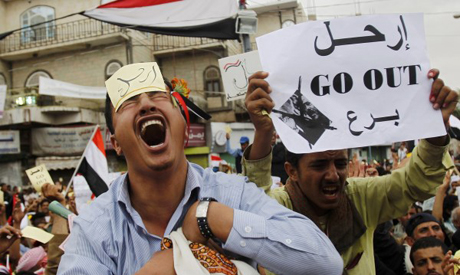
Sanaa 18 March 2011. (Reuters)
In a Bloody Friday stretching from Yemen to Bahrain and Syria, veteran leaders tried to quash uprisings inspired by the revolutions in Tunisia and Egypt after the U.N. Security Council authorised the use of force to protect civilians in Libya.
Libyan leader Muamar Gaddafi's forces shelled the rebel-held western town of Misrata, killing at least 25 people, according to residents, even as his government announced a ceasefire in response to the U.N. vote.
France, Britain and the United States said their forces stood ready to enforce a no-fly zone over Libya and prevent Gaddafi's troops attacking civilians in what would be the first international intervention since a wave of pro-democracy protests began sweeping the Arab world.
But there was no immediate military action as Western governments said they were examining the ceasefire announcement ahead of planned talks on Libya in Paris on Saturday.
Yemen's beleaguered president, a U.S. ally against al Qaeda, declared a state of emergency after at least 25 protesters were killed and hundreds wounded at an anti-government rally after Muslim Friday prayers in the capital, Sanaa.
President Ali Abdullah Saleh, struggling to keep his 32-year grip on power, denied police carried out the shooting, blaming armed opposition groups. But medical sources and witnesses said security forces and snipers opened fire on the crowds. Yemen's tourism minister resigned over the shootings.
In Syria, demonstrators clashed with police in the southern city of Deraa and at least two were killed and dozens wounded, a resident reported, in the most serious outbreak of unrest to hit tightly controlled country so far.
Several thousand protesters chanting "God, Syria, Freedom" and accusing the family of President Bashar al-Assad of corruption confronted security forces reinforced by troops flown in by helicopters, the resident said.
Saudi Arabia's King Abdullah offered an unprecedented $93 billion in handouts and boosted his security and religious police but made no political concessions to prevent unrest spreading to his absolute monarchy.
In a rare television address to the nation, the ailing 87-year-old king showered largesse on state employees and students, promised a housing drive and ordered the creation of 60,000 new security jobs.
But he was silent on a widely expected cabinet reshuffle and offered nothing to reformers hoping for moves towards democracy such as elections to municipal councils or even to the Shura Council of dignitaries that advises the monarch.
In neighbouring Bahrain, where Saudi troops intervened this week to back a crackdown on mainly majority Shi'ite protesters, security forces demolished a key monument that has been a focal point for demonstrations.
Thousands of mourners shouting "Down with King Hamad" buried a Bahraini activist killed in the crackdown that has angered Iran and raised tension in the world's largest oil-exporting region.
Bahrain's foreign minister said more troops from Gulf Arab states would arrive in the island kingdom and stay as long as needed to help restore security and stability, accusing Iran of interfering in his country's internal affairs.
The crackdowns in several Arab countries came on the eve of a landmark referendum in Egypt on Saturday on constitutional changes designed to allow free and fair elections to choose a successor to ousted ex-President Hosni Mubarak.
Egypt and Tunisia, the two countries where popular protests overthrew long-standing authoritarian systems, both said they would not participate in any military action in neighbouring Libya, although they supported an Arab League call for a no-fly zone to protect civilians.
Short link: